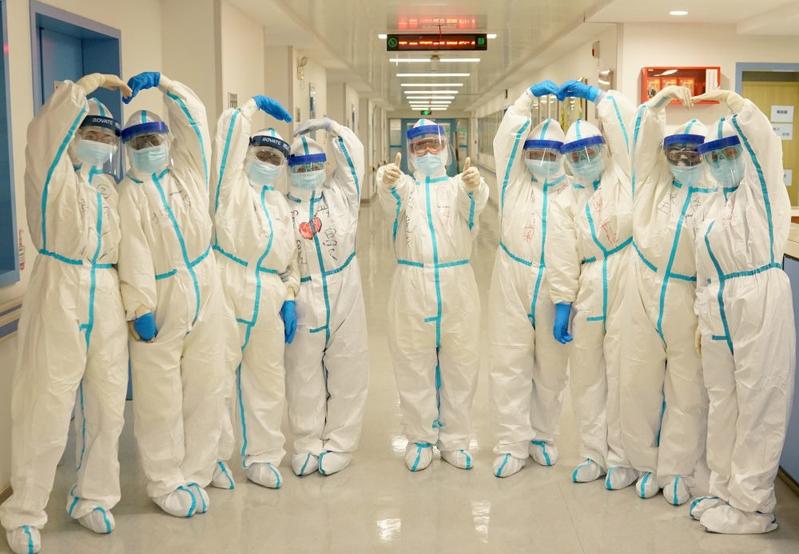A Wuhan hospital's plan to battle the COVID-19 crisis saw staff members split into groups to effectively treat critical patients, Wang Ru reports.
 Nurses pose for a group photo at the Zhongfaxincheng branch of Tongji Hospital, affiliated to Tongji Medical College of Huazhong University of Science and Technology in Wuhan, on Feb 18. (WANG YUGUO / XINHUA)
Nurses pose for a group photo at the Zhongfaxincheng branch of Tongji Hospital, affiliated to Tongji Medical College of Huazhong University of Science and Technology in Wuhan, on Feb 18. (WANG YUGUO / XINHUA)
In January, when Wuhan, Hubei province, was hit by COVID-19, many patients in the city struggled to find a sickbed. Recognizing the seriousness of the emergent situation, Tongji Hospital, affiliated to Tongji Medical College of Huazhong University of Science and Technology in the city, took the lead in restructuring its Zhongfaxincheng and Guanggu facilities, vacating 2,025 sickbeds for patients displaying severe symptoms in just 15 days.
"Facing the outbreak, it was our mission to find the direction, find effective therapies and carry out measures to fight against the pandemic promptly," Wang Wei, president of the hospital, told Xinhua News Agency.
As for the critically ill patients, Li Shusheng, a doctor from the hospital, noted that "a cough may lead to huge damage in the lungs".
But when the medical workers analyzed the causes of death, they discovered, aside from lung damage, many patients died from multiple organ dysfunctions. Taking this information on board, Liu Jihong, vice-president of Tongji Hospital, decided to separate medical workers into eight groups, each responsible for a different task, like opening patients' airways, protecting their heart functions or ensuring the health of their kidneys.
In this way, "everyone could give full play to their own strengths, and make up for their weaknesses", Liu told People's Daily.
Joining the more than 5,000 medical workers, from 40 teams all around China, the eight groups split their shifts to cover the workload at the hospital over each 24 hour period, during which they would monitor the conditions of patients on the hour.
Since COVID-19 can easily lead to sudden cardiac arrest and fulminant myocarditis, the heart-protection group was established to be prepared to save those that might be subject to underlying heart conditions.
 Nurses sort bedsheets at the hospital. (WANG YUGUO / XINHUA)
Nurses sort bedsheets at the hospital. (WANG YUGUO / XINHUA)
On the morning of Feb 19, Zhou Ning and Wang Luyun, two of the heart group doctors, after discussing the situation of a 50-year-old patient with the surname Cheng, who was suffering from respiratory failure, undertook an operation using extra-corporeal membrane oxygenation machines.
Eight days later, the patient regained consciousness and could breathe by himself again. Even in a weak state, the patient managed to utter xiexie, "thank you" in Chinese, to the medical workers.
COVID-19 can cause a large amount of inflammatory issues inside the bodies of patients, resulting in potentially serious damage to the kidneys.
During the pandemic, the kidney team spent 3,900 hours treating 371 patients. Team members all lived in the hospital to respond to calls quickly, at any time of day or night.
Arguably one of the most high-risk areas of work for the medical workers was the airway. Since the virus often led to lesions in the lung, many patients had difficulty breathing and medical workers had to open their airways manually to help them breathe. A group of 40 people were responsible for doing this at great risk of being infected, and they performed nearly 200 intubation procedures during the fight.
Experts from a mental protection group also joined the team to help. Yang Yuan, a psychological expert of Tongji Hospital, provided support and counseling to patients via a remote video calling platform.
 A member of the nephrology team conducts blood purification for a patient in severe condition. (PHOTO / XINHUA)
A member of the nephrology team conducts blood purification for a patient in severe condition. (PHOTO / XINHUA)
A patient surnamed Ren says, "I felt so grateful that the doctors would listen to my negative feelings. I felt much better after speaking out."
"Difficulties like the surging number of patients, lack of sickbeds, people and supplies did not frighten us, but enriched our sense of mission and responsibility," says Wu Jing, Party secretary of Tongji Hospital.
"With Party members as the main strength, the small teams made concerted efforts to conquer difficulties in treating severe patients, and saving lives," she adds.
Speaking about cooperation between the local groups and support teams from other places, He Fan, a member of the kidney team, says: "The support team includes many medical workers specializing in cardiology, respiration and from the ICU. We learned from each other when we worked together, and communicated a lot to reach consensus on therapies we provided to patients, so that we saved a lot of time on their follow-up treatment."
On April 26, all of the patients were discharged from Tongji Hospital, and it was reopened after being disinfected.
During the period, the hospital treated 3,539 people, of which 3,201 were classed as severe cases, with the majority of them being successfully saved.
"After the fight against coronavirus, we will increasingly cherish our work and respect life in the future," says Zhou.
Contact the writer at wangru1@chinadaily.com.cn


